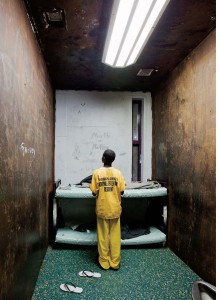Black Mothers’ Tears…
My first impression was that she didn’t look like she would suffer fools. I was sitting across from her as she eyed me skeptically. We were in a conference room at the juvenile detention center. I was talking about my organization’s work. I could hear myself droning on…
Her phone rang and she stepped out to answer it. This was a meeting for parents who had a child incarcerated at the jail. It was a small group because it was 6 p.m. on a Friday. All of the mothers were women of color (black and latina). This isn’t surprising since 97% of the young people detained at the jail are black and Latino.
When they were finally able to ask questions, there were many but most were directed to the jail staff, not to me:
1. What did their children do all day?
2. Did they attend school? Were they idle?
3. What would happen to a child classified as an “automatic transfer” on his 17th birthday? Would he be prepared by the staff before being transferred to Cook County Jail?
4. How does one afford bail in the amount of $27,000 when you are a single mother with 7 kids?
5. Why were the youth only allowed to have three people on their call lists?
At one point, the woman who had left to answer her phone returned to the room. “This is worse than prison,” she cried. In adult prison, you can include as many people on your call list as you want. She railed that only a couple of her son’s siblings were allowed to visit him at the same time. She told the story of her youngest son who has yet to be able to see his brother. “He is heart-broken. I don’t know how to explain it to him that he can’t come because he has to wait his turn. He’s only 4 years old. His brother is his idol,” she said.
Then it happened… She broke down in tears. The other mothers in the room turned away. They couldn’t face her. They were trying to hold it together themselves. If they watched her cry, then they would likely break down next. I got up and walked around the table. I sat beside the crying mother and laid a hand on her shoulder. “It’s OK,” I said. “Let it out. This is a scary time I’m sure.” Someone passed me a kleenex and I gave it to her. She started furiously wiping her eyes.
Another mother, a Latina woman, whose son is an automatic transfer spoke: “It’s too much sometimes, I know. I have to come up with $50,000 to bail my son out. It’s not going to happen. It’s too much sometimes.”
When I left the jail, as I was walking to my car, I thought of the thousands upon thousands of black mothers whose children are spending their nights locked behind bars. I thought of their tears, invisible to most of us. Evelyn C. White (1990) has written that: “the images and expectations of black women are actually both super- and sub-human (p.94).” Black women, we are caricatured as Sapphires and Jezebels. We are Mammy and Matriarch. We are Superwomen and “Mules of the World.” We don’t bleed and we certainly don’t cry. Except when we do bleed and we do cry. Every community in Chicago and perhaps in your city needs to have a support group for the parents of the incarcerated. Find out if there’s one in your community. If not, then start a group. Do it now. The need is there and it is great. The grief is there and it is great. The tears need to be shed, are being shed, and they need a container. Maybe you can provide it.
Note: Below is a poem that I want to dedicated to all of the incredible black mothers of the incarcerated:
Sister Outsider
by Opal Palmer Adisa, For Audre Lordewe
women black
are always
outside
even when
we believe
we’re in
but being
out side
ain’t so bad
cause
we be
learning
to love
each other better
we be
learning
to listen
more closely
to one another
we be
learning
to allow
all of us
our humanitysisters
are too often
out side
fronting
trying
to get over
but
we be coming
to gether
coming
together
ending our silence
transforming
space and pace
searching
and finding
the most valuable
is often
that which is
overlooked us

